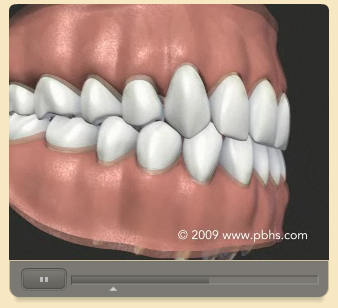Periodontal diseases are infections of the gums, which gradually destroy the support of your natural teeth. There are numerous disease entities requiring different treatment approaches. Dental plaque is the primary cause of gum disease in genetically susceptible individuals. Daily brushing and flossing will prevent most periodontal conditions.
Why Is Oral Hygiene So Important?
Adults over 35 lose more teeth to gum diseases, (periodontal disease) than from cavities. Three out of four adults are affected by periodontal disease at some time in their life. The best way to prevent cavities and periodontal disease is by good tooth brushing and flossing techniques, performed daily.

Periodontal disease and decay are both caused by bacterial plaque and can be accelerated by a number of different factors. Plaque is a colorless film that sticks to your teeth at the gum line. Plaque constantly forms on your teeth. By thorough daily brushing and flossing, you can remove these germs and help prevent periodontal disease.
If not carefully removed by daily brushing and flossing, plaque hardens into a rough, porous substance known as calculus (or tartar).
Periodontal Disease
Bacteria found in plaque produces toxins or poisons that irritate the gums, which may cause them to turn red, swell, and bleed easily. If this irritation is prolonged, the gums separate from the teeth, causing pockets (spaces) to form. As periodontal diseases progress, the supporting gum tissue and bone that holds teeth in place deteriorate. If left untreated, this leads to tooth loss.
Preventing Gum Disease
The best way to prevent gum disease is effective daily brushing and flossing as well as regular professional examinations and cleanings. Unfortunately, even with the most diligent home dental care, people still can develop some form of periodontal disease. Once this disease starts, professional intervention is necessary to prevent its progress.
Other important factors affecting the health of your gums include:
• Smoking • Clenching and grinding teeth
• Diabetes • Medication
• Stress • Poor nutrition
Dental Specialties
What Is An Oral & Maxillofacial Surgeon (OMS)?
Oral and maxillofacial surgeons are dentists specializing in surgery of the mouth, face, and jaws. After four years of dental school, surgeons receive four to seven years of hospital-based surgical and medical training, preparing them to do a wide range of procedures including all types of surgery of both the bones and soft tissues of the face, mouth, and neck.
What Is A Periodontist?
Periodontists are dentists who specialize in the diagnosis and treatment of periodontal disease. They have had extensive training with two additional years of study after dental school. As specialists they devote their time, energy, and skill to helping patients care for their gums. A periodontist is one of the eight dental specialists recognized by the American Dental Association.
Why Is Your Dentist Referring You To A Periodontist?
Your dentist has determined that your gums require special attention. The periodontist and dentist work together as a team to provide you with the highest level of care. They will combine their experience to recommend the best treatment available to you while keeping each other informed on your progress. By referring you to the specialist, your dentist is showing a strong commitment to your dental health.
What Is An Endodontist?
The endodontist examines, diagnoses, and treats diseases and destructive processes, including injuries and abnormalities of dental pulps and periapical tissues of the teeth.
Endodontists examine patients and interpret radiographs and pulp tests to determine pulp vitality and periapical tissue condition. They evaluate their findings and prescribe a method of treatment to prevent loss of teeth.
What Is A Prosthodontist?
The prosthodontist examines and diagnoses disabilities caused by loss of teeth and supporting structures. They formulate and execute treatment plans for the construction of corrective prostheses to restore proper function and aesthetics of the mouth, face, and jaw.
What Is A Pediatric Dentist?
A pediatric dentist has at least two additional years of training beyond dental school. The additional training focuses on management and treatment of a child’s developing teeth, child behavior, physical growth and development, and the special needs of children’s dentistry. Although either type of dentist is capable of addressing your child’s oral health care needs, a pediatric dentist, his or her staff, and even the office décor are all geared to care for children and to put them at ease. If your child has special needs, care from a pediatric dentist should be considered.
What Is An Orthodontist?
An orthodontist prevents and treats mouth, teeth, and jaw problems. Using braces, retainers, and other devices, an orthodontist helps straighten a person's teeth and correct the way the jaws line up.
Orthodontists treat children for many problems, including crowded or overlapping teeth or problems with jaw growth and tooth development. These tooth and jaw problems may be caused by tooth decay, losing baby teeth too soon, accidents, or habits like thumb sucking. These problems also can be genetic or inherited.
Why Go To An Orthodontist?
Your dentist or one of your parents might recommend it because they see a problem with your teeth or jaws. A child who doesn't like the way his or her teeth look might even ask to see an orthodontist.

